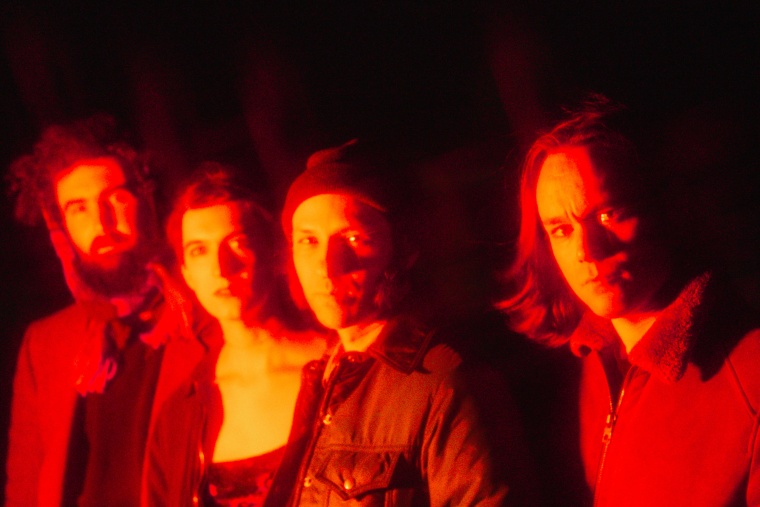 Agriculture. Photo by Math Erao.
Agriculture. Photo by Math Erao.
Agriculture’s music is sublime chaos. The Los Angeles four-piece consisting of guitarist/vocalist Daniel Meyer, drummer Kern Haug, guitarist Richard Chowenhill, and bassist/vocalist Leah Levinson make extreme black metal that’s both thoroughly mapped and spontaneously combustible, like a bomb planted under an empty corporate office building. Their 2022 EP The Circle Chant introduced the world to their white-knuckled style, but it was only a small sample.
Their self-titled, debut album — premiering now with The FADER, a day before its July 21 wide release — is both a punishing and deeply rewarding endeavor. From the slow descent of opener “The Glory of the Ocean” to the all-out catharsis of closer “Relier,” it more than achieves the band’s goal of evoking a visceral, sometimes terrifying ecstasy in the listener — the way only the best hardcore can.
In advance of Agriculture’s release, I spoke to Dan and Kern over email to discuss the process, themes, and inspirations behind their band’s remarkable debut. Stream the album exclusively below, and scroll further for the Q&A.
The FADER: I’ve noticed more artists who make extreme music describing their art as “ecstatic.” What do you think separates ecstatic black metal from the non-ecstatic kind? Is there a degree of ecstasy in all hardcore?
Daniel Meyer: At its best, extreme music is about pushing every aspect of the musical experience towards something that feels like a limit. On a musical level, that might involve playing hella fast, super-dense textures, detuned guitars, impossible drumming, and screaming. But it’s also the live show, which can involve moshing, weird dancing, or just the act of listening to something so intense. In the past, even though a lot of artists have used these techniques to describe horrible aspects of the human experience, the live shows are often scenes of communal ecstasy. I bet that anyone who has ever been to a good black or death metal show can attest to the sense of catharsis and joy that comes from gathering to listen to such intense music.
So I think in that sense, there is ecstasy implicit in all extreme music. However, our idea is to reach for that ecstatic communion from the jump. We’re trying to call attention to the fact that feelings like joy, ecstasy, and relationship with spirit are just as intense as more traditional metal expressions like depression and fear — and, ideally, draw attention away from those feelings and towards something brighter. It’s not that feeling shitty is bad or fake or unimportant; it’s just that it’s not any more or less important than any other feeling. The techniques of extreme metal are useful for getting that across.
When you read descriptions of religious ecstasy, those experiences are usually described as super intense. In Zen Buddhism, "practice enlightenment" is often likened to swallowing a ball of molten iron. You just have to let it become a part of you. So we’re trying to make music that celebrates the ecstasy of connection — with spirit, with each other, with music, etc. Maybe that sounds corny, but to me, that’s just a description of what extreme music shows, at their best, are already about.
“The Glory of the Ocean” is this massive saga of a track that’s quite a bold statement for an album opener. Its first few minutes feel almost like an overture. Were you drawing on any Classical or Romantic music for that first section?
DM: Richard and I both studied classical composition and that tradition crops up in our music — mainly in the attention we pay to form and moving from one musical structure to another. I’ve always been interested in listening to music in the way that someone might look at paintings in a gallery. You spend some time with one piece in an easily perceptible frame, then you move on to something else. You get something out of the experience of observing them sequentially. They talk to each other in your brain. That’s really apparent in “The Glory of the Ocean” because it’s so obviously sectional, but I think you hear that all over the record.
“The Well” also sort of operates as an overture, presenting themes from the album’s three-part centerpiece, “The Look,” in a less extreme way than we eventually hear them. Do you feel they hit harder this way than if you jumped right into the extreme bit?
DM: One of the things I like about screaming in a musical context is that it gives a listener some choice in how they want to engage with the vocals. Obviously, most screams are incomprehensible, so if you want, you can just engage with the screams as another instrument that kind of humanizes the whole texture. I really like listening this way, particularly with bands that write beautiful music but all the lyrics are about human sacrifice or being a vampire or whatever. I expect some people will probably want to engage with our music this way, especially since we use words like “God” to describe spirit and some people are uncomfortable with that. Knowing that people won’t know what you’re saying also gives you a lot of freedom as an artist. I change the lyrics during our live sets all the time.
But sometimes, lyrics are important. “The Well” is kind of like an articulation of our mission statement as a band — particularly the lyric “There is Always Plenty of Water” — so we wanted to make it as clear as possible.
The very quick free jazz saxophone break in “The Look, Pt. 1” reminds me of something you might hear on a late Scott Walker album. Is he an inspiration for you, and are there any other experimental artists outside the black metal canon whose work informed this album?
Kern Haug: Scott Walker is definitely an inspiration for me. I first heard his song “Farmer in the City” on a compilation, had no idea who it was but I started trying to sing like that, and shortly after performed at the International Noise Conference in 2012, where I did my best Scott Walker impersonation. Afterwards a friend said, “You going for a Scott Walker sound?” I said, “Who’s that?,” and he told me about Scott Walker. I was like, “Sounds cool, I gotta check him out,” and then I did and realized that yes, I had definitely been going for a Scott Walker sound.
On a less comic note, though: I’m a drummer and that was my first time performing without drums. Through that eerie vocal style, I felt like I could capture a lot of the feelings I access behind the drum kit. So, vice versa, on drums, I’m frequently looking to get into an unsettled space, but one that’s forcefully presented, which is how I hear Scott Walker’s music.
DM: Some of the artists we were talking about a lot are Bob Dylan — I am constantly trying to push Bob on this band. I’ve made everyone listen to “Tempest,” his 15-minute opus from 2012 about the sinking of the Titanic at least 5 times in the van — John Coltrane, Mount Eerie/the Microphones, Mahler, Bruce Springsteen, Josquin des Prez, John Dowland, and My Bloody Valentine.
“Relier” feels like a seven-minute exclamation point on the album, in that it’s pretty full on all the way through. Was it the most cathartic track for you to write and record? If so, do you still feel that way when you listen back to it?
DM: It’s funny: “Relier” is probably my favorite song on the record to listen to and one of my least favorite to play. I think when I play it, I just wish I was listening. It’s so intense the whole time, and the subject matter is more exposed and personal than anything else on the record. It’s really a prayer. And like any other spiritual thing, it’s a lot easier to receive than to deliver.
But I really love the song, and I’m really proud of how we put it together. We re-recorded the vocals for it like 7 times. I think we ultimately got it right.

